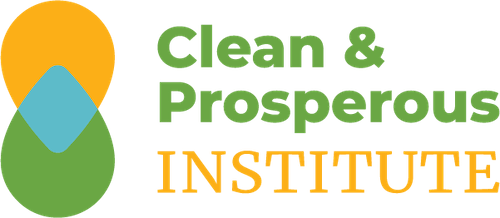What we learned in California
Lesson # 1: Dairies Drive Decarbonization
From Sacramento to San Francisco and the Silicon Valley, this year’s California Study Mission 2.0 featured a stunning array of informative sessions and insider tours to learn what California is doing to lower greenhouse gas emissions while lifting their economy. We also learned about innovations in Washington state from our delegation.
With California’s Capitol building as a backdrop, day one was set at the historic Sacramento hotel, The Citizen, where 45 participants gathered to hear from several leaders of California’s Air Resources Board (CARB) as well as the founder of a Washington state company driving decarbonization from dairies.
What we learned
 Dairy operations in California produce 45% of the total methane emissions in the state. In 2013, California passed SB 1383 which focuses on reducing methane from manure and seeks a 40% reduction in methane emissions by 2030. One of the more cost-effective ways to do that is by providing grants to dairies for digesters that capture methane from manure and channel that energy into electricity or renewable natural gas for both the transportation and consumer sectors.
Dairy operations in California produce 45% of the total methane emissions in the state. In 2013, California passed SB 1383 which focuses on reducing methane from manure and seeks a 40% reduction in methane emissions by 2030. One of the more cost-effective ways to do that is by providing grants to dairies for digesters that capture methane from manure and channel that energy into electricity or renewable natural gas for both the transportation and consumer sectors.
The CARB’s Dairy Digester program has provided funding for projects serving 177 dairies which are projected to reduce over 21 million tons of CO2e over ten years. An additional 144 projects for alternative manure management are reducing 2 million more tons of CO2e, making this the most cost-effective and most productive program CARB has implemented. The program has used 2.1% of California’s climate investments and is producing 29% of the state’s greenhouse gas reduction. It is reducing carbon emissions at less than $10 per ton.
What we can do in Washington
 Companies like Promus Energy and Koe Energy, along with the Washington State Dairy Federation, are promoting dairy digesters in Washington state to reduce methane emissions and as an alternative way to meet the increasing demand for powering electric vehicles.
Companies like Promus Energy and Koe Energy, along with the Washington State Dairy Federation, are promoting dairy digesters in Washington state to reduce methane emissions and as an alternative way to meet the increasing demand for powering electric vehicles.
“The demand for EVs and EV charging is surging and will continue to grow,” said Dan Evans, co-founder and President of Promus Energy. “We know that ultra-low carbon intensity fuel from organic waste like dairy manure can help meet that need and are excited to be successfully operating one of the first dairy digester projects in the Pacific Northwest.”
“There are approximately 270,000 dairy cows in Washington state and just a small fraction of dairies are currently using digesters, in part because of the high cost of installation and conversion,” said Jay Gordon, Policy Director for the Washington State Dairy Federation.
 With funding from the recently-passed Climate Commitment Act, Washington can establish a grant program to support our state’s dairies with a grant program for dairy digester development. We can even extend the program to other sources of organic waste streams like food waste and wastewater treatment facilities.
With funding from the recently-passed Climate Commitment Act, Washington can establish a grant program to support our state’s dairies with a grant program for dairy digester development. We can even extend the program to other sources of organic waste streams like food waste and wastewater treatment facilities.
Avoiding or lowering methane emissions will help Washington state cost-effectively reduce greenhouse gas emissions and reach our goal of net zero by 2050.
Visit these links for more information on the work of Promus Energy, Koe Energy, the Washington State Dairy Federation and California’s Air Resources Board. And keep your eye out for future lessons learned from our California Study Mission 2.0.

